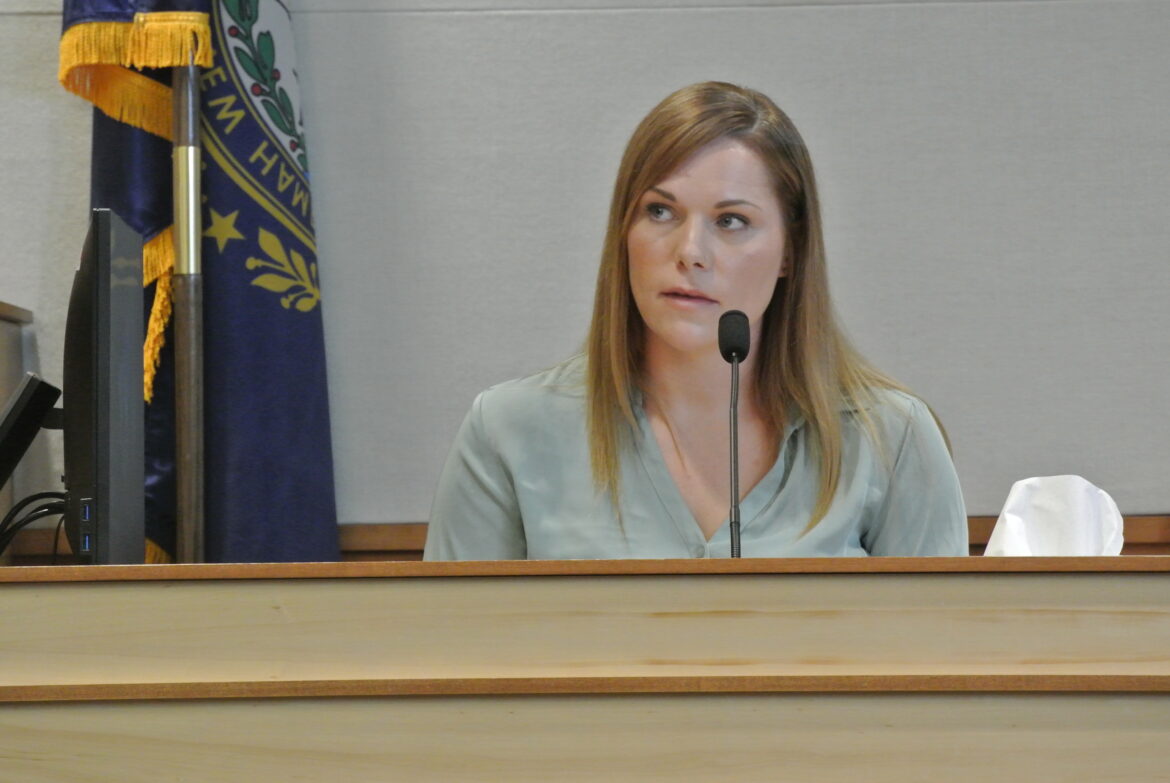By DAMIEN FISHER, InDepthNH.org
CONCORD — Lawyers for Victor Malavet, the former Youth Detention Services Unit staffer accused of sexual assault, spent Wednesday walking into errors as they tried to discredit accuser Natasha Maunsell who was 15 and 16 at the time of the alleged crimes.
It was Maunsell’s second day on the witness stand in Malavet’s trial in Merrimack County Superior Court. She mostly kept her composure as defense attorney Mariana Dominguez repeatedly questioned her credibility, raising the lies she told as a troubled teen and questioning her current personal finances.
The major lie Maunsell admits telling occurred when Malavet was first investigated in 2002 by YDC supervisors and Earl Gage, an officer from the State Office Complex Police Department. Maunsell lied to adults in 2002, denying Malavet was abusing her. Showing some emotion to the jury, Maunsell said she was scared and felt trapped and hopeless.
“I didn’t think it would matter, I didn’t think they would care, I didn’t think anyone would believe me,” Maunsell said.
This is the first criminal trial to come out of the New Hampshire Attorney General’s YDC Task Force. The task force was created in response to the massive scandal as scores of adult survivors came forward in recent years about the abuse they suffered as children incarcerated at the Youth Development Center in Manchester, YDSU in Concord and other state facilities.
The state is currently a defendant in more than 1,000 pending civil lawsuits, Maunsell among them.
Malavet, who worked as a police officer and a college campus security officer after he left YDC in the early 2000s allegedly groomed Maunsell and assaulted her between 2001 and 2002. Maunsell came under Malavet’s authority when she was being held in the detention facility for assaults she committed.
Staff inside the YDC facility controlled every aspect of the residents’ lives, Maunsell said. They dictated when the children, some as young as 10, woke up, when they went to bed, when they went to the bathroom, when they could eat, Maunsell testified.
Dominguez played a video clip from Maunsell’s 2002 interview with investigators in which the teenaged Maunsell was angry and dismissive when questioned about the alleged abuse.
“I was so locked into myself. I was scared,” Maunsell said.
There were moments when Maunsell appeared to struggle to control her emotions as she was interrogated about her past. Dominguez questioned Maunsell about an incident in which the 15-year-old Maunsell lied to staff and other residents about being a mother.
Maunsell had a troubled background when she was taken into state custody and was new to the detention facility. She said she struggled. She learned one of the other teen residents had a baby, and she began telling people she had a one-year-old who lived in Florida with the child’s father.
“I was 15 and didn’t have an identity,” Maunsell said. “I didn’t really have consequential thinking” at that age.
She eventually admitted she had lied about the baby when confronted by YDC staff, Maunsell said on the stand.
If Dominguez made any headway with jurors pushing Maunsell about her teenaged lies, she likely lost ground when delving into Maunsell’s current finances. For the past three years Maunsell has been borrowing money from a financing company that specializes in giving loans to people with potential court settlements.
Maunsell has withdrawn around $150,000 in the past three years to pay for rent, groceries, and other expenses for her family, which includes dependent children, she said.
“Situations happen,” Maunsell said.
Dominguez went after Maunsell for the cars she bought using the loan money, only to hit dead ends. In 2021, Maunsell bought a 2012 Audi a7, using some loan funds to finance the purchase. This year, she used $1,700 to buy a 2008 Honda Civic, she testified.
But Dominguez insisted that was not the only vehicle Maunsell bought. The attorney pointedly asked Mansell about the $70,000 Mustang.
“I never owned a Mustang,” Maunsell said.
When Dominguez showed Maunsell a printout of the financial statements, Maunsell identified the “Mustang” expense as a prior loan. Maunsell had borrowed about $65,000 from a different pre-trial lending company with “Mustang” in the company name. The new company paid off that loan as part of the new agreement, she said.
Dominguez next tried to call Maunsell out for lying about her Audi, showing Maunsell a police incident report in which she is driving a 2022 Audi. Maunsell explained that weeks before that report she had totaled her 2012 vehicle in an accident and was given rental on the 2022 car from her insurance company.
Dominguez drew out the fact that the current lending company charges 34.5 percent interest on any money drawn before the settlement. If Maunsell wins her civil case, the company will then get repaid with interest. If she goes to trial and loses, the company will forgive the loan. However, if Mansell is found to be lying about the abuse and she loses, she will be required to repay the loan in full with the 34.5 percent interest.
Paradoxically, while Dominguez tried to imply Maunsell is only interested in getting a large jury award, the loan terms are also a strong incentive for Maunsell to tell the truth.





